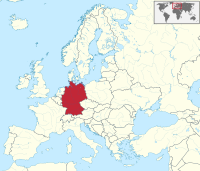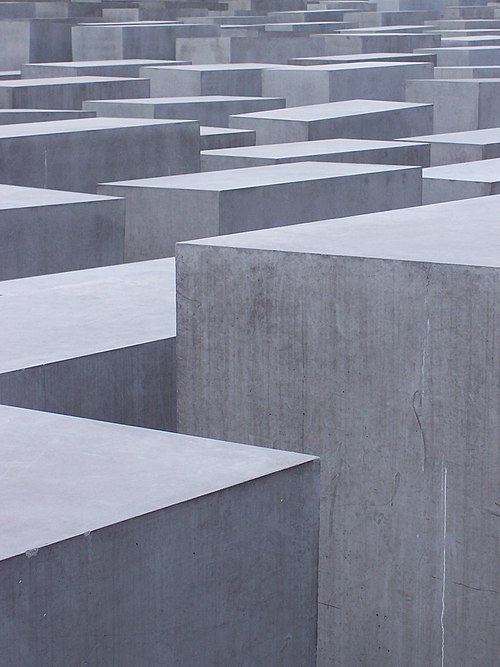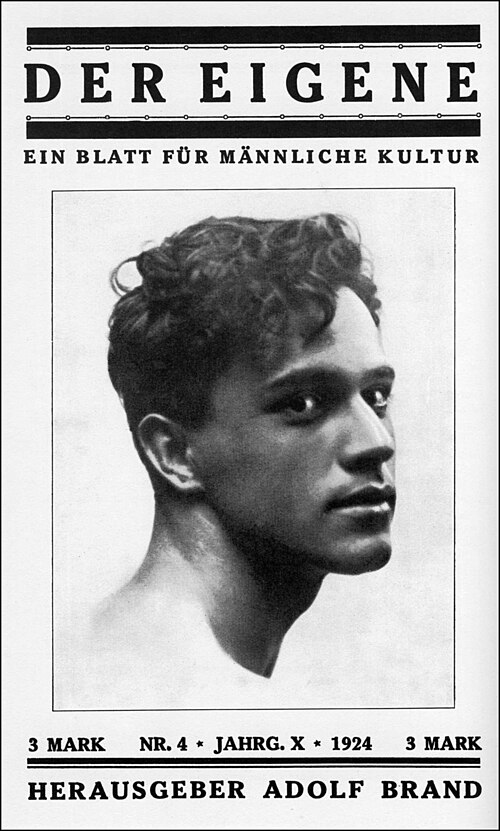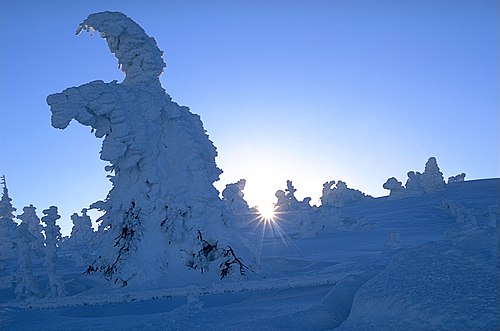Portal:Germany
Welcome to the Germany Portal!
Willkommen im Deutschland-Portal!

|

|

| |
Germany (German: Deutschland), officially the Federal Republic of Germany, is a country in Central and Western Europe, lying between the Baltic and North Seas to the north and the Alps to the south. It borders Denmark to the north, Poland and the Czech Republic to the east, Austria and Switzerland to the south, France to the southwest, and Luxembourg, Belgium and the Netherlands to the west.
Germany includes 16 constituent states, covers an area of 357,578 square kilometres (138,062 sq mi) and has a largely temperate seasonal climate. With 83 million inhabitants, it is the second most populous state of Europe after Russia, the most populous state lying entirely in Europe, as well as the most populous member state of the European Union. Germany is a very decentralized country. Its capital and largest metropolis is Berlin, while Frankfurt serves as its financial capital and has the country's busiest airport.
In 1871, Germany became a nation-state when most of the German states unified into the Prussian-dominated German Empire. After World War I and the Revolution of 1918–19, the empire was replaced by the parliamentary Weimar Republic. The Nazi seizure of power in 1933 led to World War II, and the Holocaust. After the end of World War II in Europe and a period of Allied occupation, two new German states were founded: West Germany, formed from the American, British, and French occupation zones, and East Germany, formed from the western part of the Soviet occupation zone, reduced by the newly established Oder-Neisse line. Following the Revolutions of 1989 that ended communist rule in Central and Eastern Europe, the country was reunified on 3 October 1990.
Today, Germany is a federal parliamentary republic led by a chancellor. It is a great power with a strong economy. The Federal Republic of Germany was a founding member of the European Economic Community in 1957 and the European Union in 1993. Read more...
Selected article

Knut (5 December 2006 – 19 March 2011) was a polar bear who was born in captivity at the Berlin Zoological Garden. Rejected by his mother at birth, he was raised by zookeepers. He was the first polar bear cub to survive past infancy at the Berlin Zoo in more than 30 years. At one time the subject of international controversy, he became a tourist attraction and commercial success. After the German tabloid newspaper Bild ran a quote from an animal rights activist that decried keeping the cub in captivity, fans worldwide rallied in support of his being hand-raised by humans.
Knut became the center of a mass media phenomenon dubbed "Knutmania" that spanned the globe and spawned toys, media specials, DVDs, and books. Because of this, the cub was largely responsible for a significant increase in revenue, estimated at about five million euros, at the Berlin Zoo in 2007. Zoo attendance figures for the year had increased by an estimated 30 percent. On 19 March 2011, Knut died unexpectedly at the age of four. His death was caused by drowning after he collapsed into his enclosure's pool while suffering from encephalitis. More ...
Selected picture
Related portals
- Parent portals
- Regional
- History
 Holy Roman Empire (900–1806)
Holy Roman Empire (900–1806) East Germany (1949–1990)
East Germany (1949–1990)
- Neighbouring countries
Anniversaries for April 25

- 1228 - Birth of king Conrad IV of Germany
- 1849 - Birth of mathematician Felix Klein
- 1945 - Elbe Day: Soviet and American troops meet near Torgau
- 1952 - Baden-Württemberg is founded by the merging of Baden, Württemberg-Baden, and Württemberg-Hohenzollern
Did you know...
- ... that in opposition to his parents, opera star Joseph Schwarz began his career by running away from home to join a band of traveling minstrels?
- ... that Robert Winterberg's 1911 operetta Die Dame in Rot was adapted into English for Broadway?
- ... that in 1933 Nazi sympathisers attempted to kidnap two German-Jewish filmmakers in Liechtenstein?
- ... that in just one night, thousands of books on the experiences and medical care of transgender people in Nazi Germany were burned (pictured) for being "un-German"?
- ... that pianist and composer Josef Weiss created the first film score in the history of German cinema?
- ... that the ethical dilemma of killing baby Hitler has been compared to the trolley problem?
- ... that according to Lois N. Magner, Hildegard of Bingen's Physica is "probably the first book by a female author to discuss the elements and the therapeutic virtues of plants, animals, and metals"?
- ... that Tilmann Köhler directed Mozart's Le nozze di Figaro in 2023 with playful "serious games" in which the women win by "wit, cleverness and presence of mind"?
Selected cuisines, dishes and foods

Due to its centuries-old history as a major port town the cuisine of Hamburg is very diversified and sapid as ingredients' supply was safe. Until the 20th century, the cuisine of Hamburg was predominantly characterized by the extensive choice of different kinds of fish from the river Elbe and the nearby Baltic Sea. The region of Vierlande supplied Hamburg with fresh vegetables. Fruit came from the area Altes Land and until industrialization the neighbourhood of Wilhelmsburg was considered the ‘milk isle’ of Hamburg. International trade in the Port of Hamburg made spices and exotic nutrition items from India and South America available since the 16th century, which were soon incorporated into civic kitchens.
On this basis, the cuisine of Hamburg developed which regrettably lost some of its characteristics nowadays due to the supraregional harmonization of the North German cuisine. But due to its high economic importance, Hamburg does feature many internationally recognized gourmet restaurants from which 11 were repeatedly awarded with a Michelin star in 2010. (Full article...)Topics
Categories
Things you can do

A list of articles needing cleanup associated with this project is available. See also the tool's wiki page and the index of WikiProjects.
Here are some tasks you can do. Please remove completed tasks from the list.
- Requests: German Archaeological Institute at Rome, Deutsche Familienversicherung, Dietlof von Arnim-Boitzenburg, Hennes Bender, Georg Bernhard (1875–1944), Eduard Georg von Bethusy-Huc, Rolf Brandt (1886–1953), Jan Philipp Burgard, Georg Arbogast von und zu Franckenstein, Ferdinand Heribert von Galen, Herbert Helmrich, Monty Jacobs (1875–1945), Hans Katzer, Siegfried Kauder, Heide Keller, Matze Knop, Isidor Levy (1852–1929), Markus Löning, Anke Plättner, Hans Heinrich X. Fürst von Pless, Gerd Poppe, Victor-Emanuel Preusker, Hans Sauer (inventor), Franz August Schenk von Stauffenberg, Paul Schlesinger (1878-1928),Oscar Schneider, Hajo Schumacher, Otto Theodor von Seydewitz, Dorothea Siems, Werner Sonne, Anton Stark, Udo zu Stolberg-Wernigerode, Christoph Strässer, Torsten Sträter, Joseph von Utzschneider, Jürgen Wieshoff, Hans Wilhelmi,
- Unreferenced: Unreferenced BLPs, Bundesautobahn 93, Benjamin Trinks, Steeler (German band), Amelie Beese, Zoologisches Museum in Kiel, Emil Krebs, Prussian semaphore system, Partenstein, Peter Krieg, Porsche 597, Christa Bauch, Curt Cress, Stefan Beuse
- Cleanup: 53541 issues in total as of 2024-03-03
- Translate: Articles needing translation from German Wikipedia
- Stubs: Albersdorf, Thuringia, Ingo Friedrich, Berndt Seite, Federal Social Court; 108 articles in Category:German MEP stubs
- Update: Deutsches Wörterbuch
- Portal maintenance: Update News, Did you know, announcements and the todo list
- Orphans:
Orphaned articles in Germany

- Photo: Take/Add requested photographs
- Help assess the quality of 892 unassessed articles
Associated Wikimedia
The following Wikimedia Foundation sister projects provide more on this subject:
-
Commons
Free media repository -
Wikibooks
Free textbooks and manuals -
Wikidata
Free knowledge base -
Wikinews
Free-content news -
Wikiquote
Collection of quotations -
Wikisource
Free-content library -
Wikiversity
Free learning tools -
Wikivoyage
Free travel guide -
Wiktionary
Dictionary and thesaurus














































